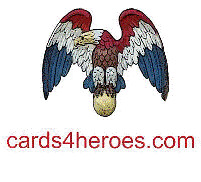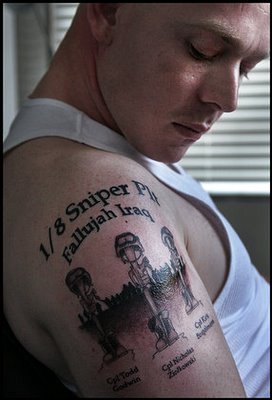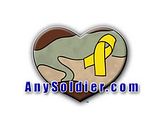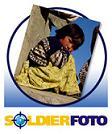Indelible Memories For Veterans of Iraq
By Christian Davenport
Washington Post Staff Writer
Sunday, November 6, 2005;
He prayed that every Marine entrusted to his care would make it out of Iraq alive. But a roadside bomb claimed one of his men, then two more fell in Fallujah. Now, almost a year after Capt. Michael Pretus returned from the war, he said, "There's not a day, not an hour that goes by that I don't think of them."
So, on a Sunday afternoon last month, he walked into a Fredericksburg tattoo parlor and had their names etched into his right shoulder in precise lettering fit for a plaque. Above each is the symbol of a fallen warrior: a pair of empty boots and an erect rifle, adorned with a helmet. In the background, silhouettes of 20 other Marines represent the surviving members of Pretus's platoon.
Behind them is the orange-red glow of a sunset -- or a sunrise. Pretus, a 30-year-old from Fredericksburg with a Marine's muscular build, a sniper's intense gaze and a scholar's sense of history, hasn't decided which.
"This is my tribute to them," he said, as the artist's buzzing tattoo machine injected ink into his arm. "They are my heroes. . . . As a platoon commander, these parents look at you and say, 'Take care of my son.' It eats at you. I wish I could have brought them all home alive."
Commemorating combat experience with a tattoo is a warrior ritual that stretches back centuries, a practice "as old as war itself," said C.W. Eldridge, a historian for the National Tattoo Association and owner of the Tattoo Archive, a Berkeley, Calif., tattoo studio.
Like their counterparts in past wars, Iraq veterans are choosing traditional patriotic symbols -- U.S. flags, eagles, names of units -- for their tattoos. But some images are strikingly personal. Aided by improved pigments and more sophisticated equipment, they reveal in graphic detail the pain and permanence of war.


































<< Home